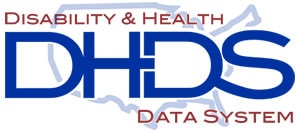Disability & Health U.S. Profile Data for the District of Columbia (Adults 18+ years of age)
Print this page [PDF 275 KB, 1 page]
Disability Impacts District of Columbia
Everyone can play a role in supporting more inclusive state programs, communities, and health care to help people with disabilities be well and active in their communities. Join CDC and its partners as we work together to improve the health of people with disabilities.

Percentage of adults in DC with select functional disability types
Mobility: Serious difficulty walking or climbing stairs
Cognition: Serious difficulty concentrating, remembering, or making decisions
Independent living: Serious difficulty doing errands alone, such as visiting a doctor's office
Hearing: Deaf or serious difficulty hearing
Vision: Blind or serious difficulty seeing, even when wearing glasses
Self-care: Difficulty dressing or bathing
Adults with disabilities in DC experience health disparities and are more likely to report...1
Disability Healthcare Costs in DC2
- About $2.7 BILLION per year, or up to 35% of the state’s healthcare spending
- About $27,839 per person with a disability

Visit Disability and Health Data System to find additional topics about the health and wellness of adults with disabilities in your state.
Note: Data are rounded to the nearest whole figure. For more precise prevalence data, please visit dhds.cdc.gov.
- Data Source: 2022 Behavioral Risk Factor Surveillance System (BRFSS).
- Disability-associated healthcare expenditures are presented in 2017 dollars as reported by Khavjou, et al. State-level health care expenditures associated with disability. 2021 Public health rep.

